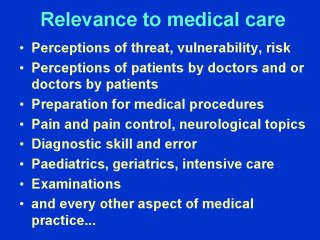 |
So why is perception of
relevance to medical practice? Perception affects our behaviour and activity. We perceive
we in control of what we do, but in reality you are much more controlled by your
contigencies and perceptual patterning, language and the extent that you can manipulate
the symbols and environment to achieve the outcomes you prefer than you might think. The
extent to which people perceive themselves to be threatened or at risk influences their
use of health care systems, consultation and health behaviour, as well as dictating their
risk-taking behaviour (other people get sick and die, but I bet you don’t really
realise that it will happen to you too one day, do you? No. See? Perceptual distortion.
How you perceive your patients (compare how you perceive your patients now to how you will
perceive them when you do your House Officer year) and how they perceive you will depend
on a range of factors beyond your personal control, but which can be modified by careful
attention to your habits of thought. The perceptions of patients are influenced by their
expectations. What they perceive will depend on what things mean to them. What things mean
will depend on their past experience and their knowledge. The importance of good
communication is crucial. When carefully well prepared, people can be very strong, when
unprepared, very afraid. Pain can be better controlled through an understanding of
perception (see my MS lecture on pain) while a more accurate perception of the level of
pain patients have to tolerate may help improve care for a wide range of surgical, burns,
arthritis and cancer patients, to name just a few. Specific deficits in perceptual ability
can be vital in diagnosis and assessing neurological impairments, and optimizing
rehabilitation measures. Diagnosis is a process of pattern recognition - subtle shifts in
the focus of attention can block new stimulus configurations and prevent the detection of
a rare condition, and perhaps delay vital treatment. In paediatrics, geriatrics, and every
branch of medicine in between perception is central to what occurs, but mostly you wont
think about it, though it will affect profoundly what you do, why you do it, and of course
its consequences.Oh yes, and it also affects the answers you give to exams too, because of
how you perceive the questions….. |
